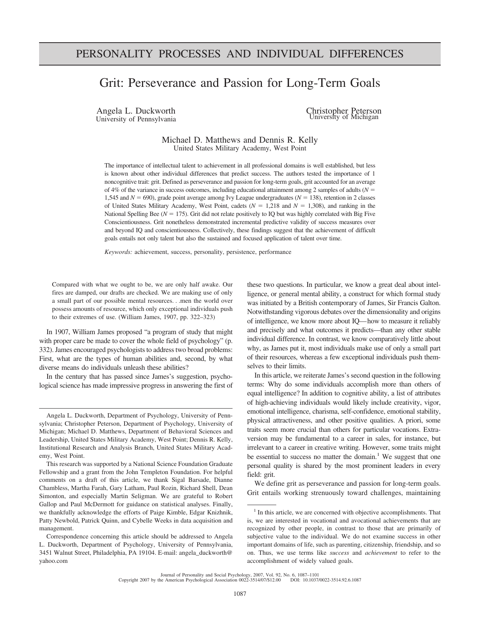Grit: Perseverance and Passion for Long-Term Goals - Journal of Personality and Social Psychology
The journal article "Grit: Perseverance and Passion for Long-Term Goals" in the Journal of Personality and Social Psychology is focused on the concept of grit and how it relates to individuals' ability to persist in achieving long-term goals. It explores the characteristics of grit, such as perseverance and passion, and examines their impact on individuals' success and well-being. The article provides insights into the psychological factors that contribute to an individual's ability to overcome challenges and stay committed to their goals over an extended period of time.
The article "Grit: Perseverance and Passion for Long-Term Goals" was written by Angela Duckworth and Christopher Peterson and was published in the Journal of Personality and Social Psychology.
FAQ
Q: What is 'Grit: Perseverance and Passion for Long-Term Goals'?
A: Grit: Perseverance and Passion for Long-Term Goals is a journal article published in the Journal of Personality and Social Psychology.
Q: What is the main focus of this journal article?
A: The main focus of this journal article is the concept of 'grit' and how it relates to achieving long-term goals.
Q: What is 'grit'?
A: Grit refers to a person's ability to persevere and maintain passion for their long-term goals, despite facing setbacks or challenges.
Q: Why is 'grit' important?
A: Grit is important because it is believed to be a significant predictor of success and achievement in various domains of life.
Q: What does this journal article discuss about 'grit'?
A: This journal article discusses various aspects of 'grit', including its measurement, its influence on success, and potential factors that contribute to the development of grit.
Q: What are the key findings of this journal article?
A: The key findings of this journal article include the significance of grit in predicting performance, the role of grit in overcoming adversity, and the potential for developing grit through deliberate practice.
Q: Who conducted the research mentioned in this journal article?
A: The researchers conducting the research mentioned in this journal article are not specified as the focus is on the concept of 'grit' and its implications rather than a specific study.































